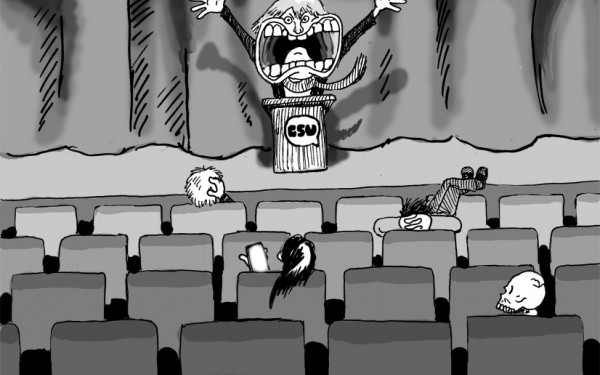Editorial: Rules Aren’t Made to be Broken
At last week’s Concordia Student Union council meeting, some tension surfaced within the executive.
Pledges to make the union more accountable—namely, financial oversight and fee levy vote policy—were seen by some as impediments to getting things done.
Last year, the CSU’s financial committee struggled to hold regular meetings and the budget was blown.
VP Finance Scott Carr was elected on a platform of putting the CSU’s fiscal house in order, and over the summer financial controls were amended to require FinCom to approve any spending.
However, council voted at their most recent meeting to make that approval apply only to expenditures over $1,000.
Considering last year’s union broke their student life budget by throwing a $9,000 party for themselves—and that CSU spending on a poorly-attended ASFA event went unchecked—we think a stronger FinCom is a great idea. The union can’t be taken seriously if there are still concerns being raised about their spending.
Having such checks and balances also makes working for the union more attractive for business-minded students. Overseeing budgets of millions of dollars only looks good on a CV if it’s with a reputable organization.
Considering we have a world-class business school, it only makes sense to try and build a climate attractive for those serious about accounting.
But the biggest source of tension right now seems to surround the Concordia Food Coalition.
There are clearly divergent opinions on the executive about what to do, and council is divided on the issue, too. A motion to allow the CFC a chance at a fee levy this semester failed 4-3, with the discussion to be continued at a special meeting later this week.
The CFC didn’t file all its paperwork in time to meet the union’s standing regulations for fee levy referendum requests, and while they can be exempted from this rule with a two-thirds majority vote from council, being short on time this semester just doesn’t seem like a good enough reason for skirting council regulations.
A fee levy is a huge undertaking that leads to giving a small group access to thousands of dollars of student money. Rushing a fee levy seems like the wrong time to exempt a motion from Council’s standing regulations.
An argument for providing an exemption for the CFC is that it would’ve needed to get its paperwork filed at the beginning of September, something they failed to do. But having the application process span a number of months is an important safeguard to make sure student money is being spent responsibly.
Like the new regulations that gave FinCom power over expenses, the fee levy policy works to keep student money from being abused. CUTV (under management that is no longer affiliated with the station) was given this exemption before, and last year’s spending is still under scrutiny.
If there are issues with these regulations, then they can be amended. It happened last winter, when the three-month lead-up time was shortened to two months.
But making exemptions for one group is bad practice. Given that the CFC is close to the executive and considering that it’s working towards the union’s goal of ending Concordia’s relationship with Chartwells, it opens the door for critics to cry favouritism—or discrimination—among fee levy hopefuls who have followed procedure.
We support the CFC’s goals, but we also question the validity of pushing ahead with the referendum this semester.
Rebuilding the student body’s faith in our union is their biggest task this year. Other goals should not work to undermine that. Well-regulated policy on spending—both by the union and its fee levy groups—is an essential part of fostering that faith.
A special meeting has been called to sort all this CFC business out. Council will have to make the unfortunate choice between denying a time-sensitive student group a shot at funding, and following their own rules.
But it’s imperative that Council thinks in the long term when casting their vote on Wednesday.
An earlier version of this article reported the CFC already receives a fee levy, which they do not. The Link regrets the error.






